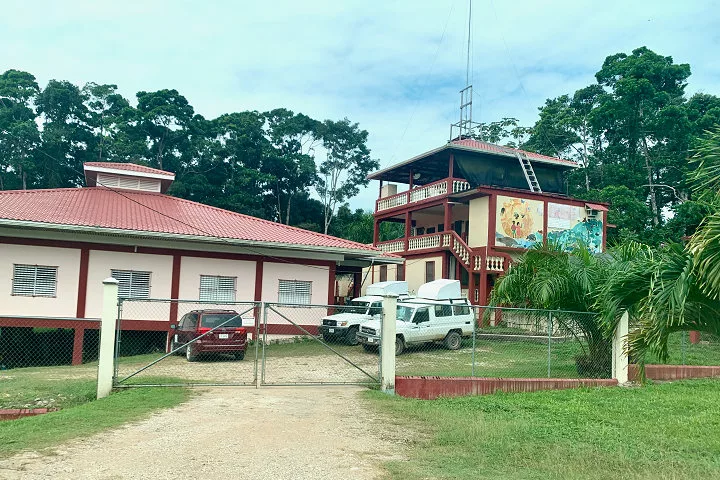Jeff Hartman earns Fulbright to integrate physical therapy, global health
Jeff Hartman, PT, DPT, MPH, imagines a world where physical therapy is used globally to improve the health and function of all. Thanks to a 2020 Fulbright Scholar Award, Hartman – an assistant professor of family medicine and community health and member of the teaching faculty for the Doctor of Physical Therapy Program – pushed this goal forward recently in the Central American nation of Belize.
His goal is to build worldwide awareness about the definition, scope, and impact of physical therapy. In addition to helping patients recover from experiences such as surgery or injury and helping people regain mobility, physical therapists promote the physical and mental health of individuals in the communities they serve. Many also advocate for accommodations to address the physical needs of people with disabilities or who experience movement impairments.

“We aren’t just talking about disabilities and surgeries, but also diabetes, hypertension, mental health, women’s health, and chronic pain,” Hartman said. “There are more and more physical therapists starting to get involved in these major problems in communities. I believe physical therapists have a unique perspective on the ways we fit into the public health world.”
With a long history of service abroad, Hartman was no stranger to Belize. While earning his master’s in physical therapy from the University of Evansville in Indiana, he completed an international clinical internship abroad. The experience planted a seed that continued to grow. Hartman went on to earn a doctorate of physical therapy from the University of St. Augustine and after more experience abroad, including in Sierra Leone, decided to pursue public and global health in earnest.
In 2005, he matriculated here at UW–Madison as a member of the inaugural master of public health class, also earning a certificate in global health through the Global Health Institute. During his studies, Hartman traveled to Belize for the first time to the Hillside Clinic to spend three months conducting a needs assessment in hopes of laying the foundation for a rehabilitation program at the clinic. The Hillside Healthcare International Foundation, based in Milwaukee at that time, found his report so useful that they hired him as the stateside director of operations, and invited him to help the board of directors and the Hillside Clinic leadership team manage many of its operations for five years.
“My journeys abroad made me realize I needed to learn more about the big picture of global health,” he said.
In 2014, Hartman became an assistant professor of physical therapy at Northwestern University, and joined the School of Medicine and Public Health faculty in 2019. He says pursuing a Fulbright Scholarship was a natural fit to continue his work in Belize so he could take the work he had done in a single district to the national level.
“It allowed me to advocate for the profession and the other professions across the whole country,” he says. “I did a situational analysis of the rehab professions to bring awareness to the lack of human resources devoted to those professions in the country. It was kind of full circle because I first went to Belize through my MPH program at Wisconsin, and now that I’m back at Wisconsin I got to continue my work in Belize. It was such a cool opportunity.”
Hartman and his family — his wife Brooke, toddler, and nine-month-old twins — flew to Belize on New Year’s Eve 2019. His work involved interviews with practicing physical therapists in Belize. He made it a goal to talk with every single one.

He achieved this using his established networks of physical therapy professionals, word of mouth, the internet, and social media. Hartman delved into learning all he could about local physical therapists’ background and training, the services they provide, and the challenges and barriers they face. He also contacted leaders of Belizean organizations that provide resources for people with disabilities, as well as members of the country’s ministry of health and other governmental departments.
“There are also global organizations devoted to physical therapy that had no idea of the scope of practice in Belize, so I made contacts with them and offered to share my data,” Hartman says. “It was very helpful for them to be able to map out at a regional level what is going on in the country. It was exciting to be able to contribute to their work as well.”
Hartman’s project also had an educational aim. He worked with the University of Belize to propose curriculum changes so that all nurses, teachers, and social workers have a better understanding of the challenges faced by those with disabilities.
Hartman says the biggest impact of his work was being able to connect Belizean physical therapists with one another, which sparked an unofficial Belize physical therapy association that they hope to formalize in the future.
“They can begin to refer patients to each other and form a community,” he explains. “We’ve stayed in touch ever since. To me, it’s one of the most beneficial things I facilitated in Belize.”
His stay in Belize was supposed to last until the middle of May 2020, but the COVID-19 pandemic forced a return to the United States in March. He was unable to complete the last part of his project, which was to distribute his findings across the country. He had planned talks at embassies and had booked segments on morning news shows.
Although he was disappointed to leave early, he feels proud of his positive impact and believes the country will benefit even more from Belizean practitioners being the face of physical therapy in the country. He has disseminated his report and, along with colleagues in Belize, is publishing two articles in regional peer-reviewed medical journals in Belize. He has also been able to present findings virtually at conferences based in Wisconsin, Orlando, and Dubai.
Throughout his career and time abroad, Hartman says his perspective has evolved on his role as a health care professional applying his skills and perspective as a guest in another country, coming to grips with the limitations imposed by his own biases.
“I will admit that when I started I felt like I was the savior who had this knowledge and skills these people needed,” he says. “I’ve since learned and observed how very dangerous that can be for many reasons. I’ve worked, and am still very much working, to change my perspective. I have learned a lot about the ethics of global health, development, social justice, and health equity. Because I’ve seen the damage that can be done, I also work to teach my students the same lessons. I’d love to help others who are interested in [pursuing] a Fulbright and doing this kind of work.”